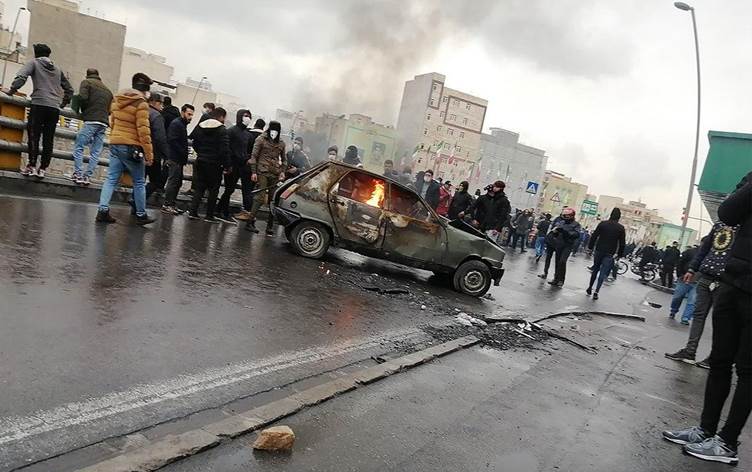
Iranian protesters gather around a burning car during a demonstration against an increase in gasoline prices in the capital Tehran, November 16, 2019. Photo: AFP
Spontaneous protests broke out across Iran on Friday night and into Saturday after the government of President Hassan Rouhani decided to increase the price of petrol from 1000 ($0.10) to 3000 tomans ($0.30) per liter.
Protesters clashed with riot police in several cities leaving at least ten dead by late Saturday evening according to rights groups.
“I said I am not an expert in this field but if the heads of three bodies decide on something, I will support them,” Khamenei said in a statement on Sunday morning, referring to the decision of the three branches of government to hike the price.
“There is no doubt that some people are concerned. However burning banks is not the work of people. This is the work of thugs ... these corrupt acts do not resolve any problems apart from adding insecurity to the problems.”
“Some respected officials appeared on TV and said they are careful not to allow this price hike to increase the price of goods. This is important because the inflation exists now,” Khamenei added.
Iran’s supreme leader, who heads the powerful Islamic Revolutionary Guard Corps (IRGC), called on the nation’s security services to quell the unrest. “The officials in charge of the security must fulfill their duties,” he said.
The petrol price hike come at a sensitive time for the Iranian people and the government as a severe economic downturn caused by US sanctions has slashed purchasing power and emptied government coffers.
As recently as just two days ago, Rouhani’s officials ruled out plans to hike the price of fuel. Many were therefore left bewildered by the government’s drastic move.
While Rouhani and his ministers reassured the public on Saturday that the revenues from the price hike would be used to support struggling families, this was not enough to quell public anger.
The fuel protests quickly spread from a handful of towns and cities on Saturday morning to the whole of the country, with demonstrators chanting anti-government slogans.
Iran was a net importer of petrol for decades, but earlier this year oil minister Bijan Zanganeh announced the country had become self-sufficient in the production of fuel.
Iran’s petrochemical industry has become an important source of revenue for the government, exporting large quantities of petrol to neighboring countries including Iraq and the Kurdistan Region.
Sayyid Ali Hosseini, managing director of Iran’s Energy Exchange, said on September 23 the country has earned close to $200 million per week since it started selling petrol in the energy exchange in late July and subsequently exported it to neighbors.
With his statement, Khamenei, the ultimate decision maker in the country, will put an end to the efforts of some parliamentarians who are trying to appease the protesters by announcing on Saturday night that they would rush a bill through the parliament to compel the government to cancel the price hikes.
Khamenei’s modus operandi in dealing with protests is not something new. His tried and tested method of green-lighting crackdowns, arresting ring leaders, and using limited lethal force to disperse protesters has succeeded in previous periods of unrest.
Human rights organisations reported that at least ten people were killed, most of them in the Kurdish areas in the west of the country, as protesters put up barricades and set banks and police stations on fire on Saturday.
Four were reportedly killed in the western city of Mariwan and at least two more in the town of Javanrud in Kermanshah province.
Iranian state media has not commented on the deaths except for that of one protester who was killed on Friday night in the town of Sirjan in the central province of Kerman.
There were reported of total internet shutdown on Sunday morning across the country.
US State Department spokesperson Morgan Ortagus tweeted on Saturday: “The US stands with the long-suffering Iranian people as they protest the latest injustice by the corrupt regime in power. We condemn the attempted shutdown of the internet. Let them speak! #IranProtests.”
Human Rights Watch Iran researcher Tara Sepehri Far called on the Iranian government to respect the right of peaceful assembly and to refrain from using excessive force.
Concerning reports of protests deaths and internet shutdown during #IranProtests. Iranian authorities are obliged to respect the right to peaceful assembly, refrain from excessive use of force, and shutting Iranians’ access to internet, and it looks like they’re already failing. pic.twitter.com/CuKmWwcGdi
— Tara Sepehri Far (@sepehrifar) November 16, 2019
“The disciplinary force has no tolerance with those who disturb the peace and security,” Iranian police spokesman Ahmad Nourian said immediately after Khamenei’s message was broadcast.
“We will identify the ringleaders and their field agents and deal with them.”
According to opposition activists posting on messaging app Telegram, protests resumed on Sunday with activity in Tehran and Sanandaj.









Comments
Rudaw moderates all comments submitted on our website. We welcome comments which are relevant to the article and encourage further discussion about the issues that matter to you. We also welcome constructive criticism about Rudaw.
To be approved for publication, however, your comments must meet our community guidelines.
We will not tolerate the following: profanity, threats, personal attacks, vulgarity, abuse (such as sexism, racism, homophobia or xenophobia), or commercial or personal promotion.
Comments that do not meet our guidelines will be rejected. Comments are not edited – they are either approved or rejected.
Post a comment